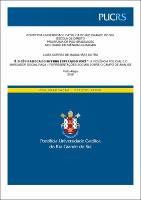| Share record |


|
Please use this identifier to cite or link to this item:
https://tede2.pucrs.br/tede2/handle/tede/8887| Document type: | Dissertação |
| Title: | “É o céu da boca do inferno esperando você” : a violência policial e o marcador social raça – representações sociais sobre o campo de análise |
| Author: | Dutra, Luiza Correa de Magalhães  |
| Advisor: | Azevedo, Rodrigo Guiringhelli de |
| Abstract (native): | Este trabalho tem, como foco principal, um estudo de caso acerca da Instituição da Polícia Militar do Estado do Rio Grande do Sul. Procura-se analisar as representações sociais sobre a atuação dessa Instituição, tanto dos policiais militares como da sociedade civil, trazendo como centro guiador do trabalho os debates sobre violência policial e suas relações com o marcador social raça e a racialização. Logo, a pesquisa teve como objetivo central analisar a existência e influência do marcador social raça na abordagem policial, identificando sua relação com a própria construção do campo de Segurança Pública no Brasil. Tudo a partir de um olhar voltado para a ideia da existência de representações sociais que moldam - e são moldadas - pelos atores sociais presentes nesse contexto. Para tanto, buscamos traçar, em linhas gerais, um estado da arte da formação da Polícia Militar no Brasil, bem como a formação dos próprios policiais militares dentro dessa Instituição, trazendo as aproximações e diferenças de alguns estados do Brasil. Ademais, buscou-se debater sobre o mandato policial e a legitimidade de atuação dessa Corporação. O marcador social da diferença raça foi trazido através de um caminhar histórico do fim da escravidão no Brasil, bem como de sua relação com os debates sócio-geográficos e sua aproximação com a chegada da Escola Positiva de Criminologia em nosso país. Em um cenário de aproximação dos debates trazidos, o trabalho de campo realizou-se a partir de entrevistas com 12 Oficiais da Brigada Militar do Rio Grande do Sul, bem como através de 2 grupos focais com jovens que frequentavam o Centro da Juventude da Lomba do Pinheiro, em Porto Alegre. Articulando esses dois campos, destacam-se as percepções dos atores sociais acerca da violência policial e do próprio fazer-policial, além da influência do marcador social raça nesse campo de interação. Os resultados elucidaram uma dinâmica de interação polícia-comunidade inserida em um imaginário/percepção de combate constante, permeado por medos e angústias trazidos pelos atores. Os processos identitários são (re)construídos nessas relações e nesses embates de afirmação do “eu” em relação ao “outro”, sendo atravessados por processos de racialização que carregam consigo a construção social do “suspeito nato”. |
| Abstract (english): | This paper is a case study about the Military Police Institution of the State of Rio Grande do Sul. It seeks to analyze the social representations on the operation of this institution, focusing on the debate on police violence and its relations with race and racialization. This research aims to analyze the existence and influence of race as a social construct in the police approach, identifying its relations with the Public Security in Brazil associated with the idea of social representations that shape (and are shaped by) the social actors present in this context. We seek to outline the state of the art of Military Police formation in Brazil, as well as the shaping of Military Police officers within this Institution, bringing up the similarities and differences between some Brazilian states. In addition, we sought to discuss the police warrant and the legitimacy of this action. The social marker Race was brought through a historical analysis of the end of slavery in Brazil, as well as its relation with the social and geographical debates and its approach with the arrival of the Positive School of Criminology in Brazil. The fieldwork was carried out from interviews with 12 officers of the Military Brigade of Rio Grande do Sul, as well as through two focus groups with youngsters of the Youth Center at Lomba do Pinheiro district in Porto Alegre. The social actors' perceptions on police violence and the police-making itself, as well as the influence of the racial social marker on this field of interactions, stands out. The results elucidated a dynamic of police-community interaction embedded in an imagery/perception of constant combat, permeated by fear and anguish brought by the actors. Identity processes are (re)constructed in these relations and in these affirmation of the "Self" in relation to the "Others," being permeated by processes of racialization that carry within the social construction of the "born as a suspect." |
| Keywords: | Polícia Militar Violência Policial Representações Sociais Racialização |
| CNPQ Knowledge Areas: | CIENCIAS SOCIAIS APLICADAS::DIREITO |
| Language: | por |
| Country: | Brasil |
| Publisher: | Pontifícia Universidade Católica do Rio Grande do Sul |
| Institution Acronym: | PUCRS |
| Department: | Escola de Direito |
| Program: | Programa de Pós-Graduação em Ciências Criminais |
| Access type: | Acesso Aberto |
| Fulltext access restriction: | Trabalho será publicado como artigo ou livro |
| Time to release fulltext: | 60 meses |
| Date to release fulltext: | 19/09/2024 |
| URI: | http://tede2.pucrs.br/tede2/handle/tede/8887 |
| Issue Date: | 22-Jan-2019 |
| Appears in Collections: | Programa de Pós-Graduação em Ciências Criminais |
Files in This Item:
| File | Description | Size | Format | |
|---|---|---|---|---|
| DIS_LUIZA_CORREA_MAGALHAES_DE_DUTRA_COMPLETO.pdf | LUIZA_CORREA_DE_MAGALHAES_DIS | 1.7 MB | Adobe PDF |  Download/Open Preview |
Items in DSpace are protected by copyright, with all rights reserved, unless otherwise indicated.




